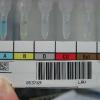Leaderboard
-
Points189Posts
-
.jpg.c873029d6ea548a78cb17a21407a1303.jpg) Points2,989Posts
Points2,989Posts -
-

Popular Content
Showing content with the highest reputation on 05/23/2019 in Posts
-
Massive Transfusion and Incompatible Plasma
Massive Transfusion and Incompatible Plasma
Ensis01 and 3 others reacted to Baby Banker for a post in a topic
4 pointsThere is some truth in that, and especially from his perspective. However I have found that surgeons are not the best when it comes to understanding Transfusion Medicine.4 points -
Massive Transfusion and Incompatible Plasma
Massive Transfusion and Incompatible Plasma
David Saikin and 3 others reacted to Dansket for a post in a topic
4 pointsThere was a prominent trauma surgeon who said, "Patients die from the blood they don't get, not the blood they do get".4 points -
Massive Transfusion and Incompatible Plasma
Massive Transfusion and Incompatible Plasma
Yanxia and 2 others reacted to jayinsat for a post in a topic
3 pointsConsidering the push to using Low Titre O Whole Blood for MTP and trauma's, i'd say the benefit outweighs the risk. I have personally seen two incidents where a panicked Blood Banker accidentally issued O FFP in emergency release situations. In both cases, the patients turned out to be incompatible blood types (one A one B). Guess what, there was no adverse effect whatsoever in either case. No sign of hemolysis or transfusion reaction weeks later.3 points -
Massive Transfusion and Incompatible Plasma
Massive Transfusion and Incompatible Plasma
TreeMoss and 2 others reacted to David Saikin for a post in a topic
3 pointsI think it depends on what is going on. Look at the history of liver transplants. When they started, pts were getting upwards of 400u rbc. The first 20 and last 20 were abo compatible. in between it was whatever was available. I've seen massive transfusions where the patient was mistyped, receiving 20+u incompatible rbcs. Everything was fine for a few days - until the dilution factor was overcome by the pt's own immune system coming back on line. Patient doesn't survive that. Maybe, if you have to go with significant ABO incompatible plasma (O) you could switch the pt to O rbcs to reduce hemolytic activity. Have to remember the ABO abs are going to be diluted by the volumes of other solutions which are usually being infused at the same time. If the need is for coag factors, pharmacy should be able to provide recombinant products. It's a tough nut.3 points -
Massive Transfusion and Incompatible Plasma
Massive Transfusion and Incompatible Plasma
AMcCord and one other reacted to jalomahe for a post in a topic
2 pointsconsult with pathologist and keep in mind If you absolutely have to give incompatible plasma the ideal is to give it while patient is actively bleeding. If possible give RBCs that will be compatible with patient and the plasma so in your case O and as the bleeding is beginning to come under control start giving ABO compatible plasma to "top them off". The idea is that as long as patient is actively bleeding give them the incompatible product which is then being bled out onto the floor or wherever. Once bleeding is under control give the good stuff to help dilute the incompatible out and leave them with the most compatible antigen/antibody combinations possible.2 points -
Massive Transfusion and Incompatible Plasma
Massive Transfusion and Incompatible Plasma
TreeMoss and one other reacted to David Saikin for a post in a topic
2 pointsAnd in this vein - look at all the ABO incompatible plts we are forced to give (esp when you can only get group O)2 points -
BloodBankTalk: Clinical Aspects of Transfusion Reactions
BloodBankTalk: Clinical Aspects of Transfusion Reactions
Malcolm Needs reacted to gagpinks for a post in a topic
1 pointI just answered this question. My Score PASS1 point -
Human versus monoclonal reagents
Human versus monoclonal reagents
Malcolm Needs reacted to Amra23 for a post in a topic
1 pointI didn't know that! This is something I will always have to remember!1 point -
Human versus monoclonal reagents
Human versus monoclonal reagents
SbbPerson reacted to Malcolm Needs for a post in a topic
1 pointA few things as far as human reagents. Firstly, you never know what else may be in them in terms of antibodies directed against low prevalence antigens, because there is absolutely no way that the producer has the ability to test for all such specificities (I can remember once a human-derived anti-D reagent produced at one of the places I worked, also had a Gm antibody in it that we didn't know about. It is highly unlikely that this would have caused too many problems, but there is, nevertheless, a small chance that this could have caused a false positive). Secondly, you never know what else may be in them in terms of viruses, some of which may, as yet, be unknown to us (remember, HIV, used not to be known). This is a danger to the producer and the person using the reagent, rather than the patient. Thirdly, the avidity of human reagents is, in general, pretty poor (particularly anti-D). A few things concerning monoclonal reagents. Some of them cross-react with other specificities (although not many), but, famously, monoclonal anti-D reagents will react with the I and i antigens if used straight from the fridge. They have to be blended by experts to ensure that the desired epitopes are detected, but certain Partial D types (e.g. Partial D Type VI) are not detected (unless required). They are very specific and very avid (both of which are greatly to be desired). Virally, they are almost certainly sterile. Hope that helps.1 point -
Massive Transfusion and Incompatible Plasma
Massive Transfusion and Incompatible Plasma
AMcCord reacted to Baby Banker for a post in a topic
1 pointThe size of the patient can be a factor in how much incompatible plasma you can safely give, but in an MTP you are poring the blood products in, and often it is poring right back out. The comment on giving platelets is well founded.1 point -
Gold Medal.
Gold Medal.
Malcolm Needs reacted to jnadeau for a post in a topic
1 pointA gentleman and a scholar (and a natural comedian). Thanks for sharing your knowledge in such an understandable way through the years - and now with this pic I can point to my reference! Congrats again1 point -
Gold Medal.
Gold Medal.
Malcolm Needs reacted to Karen knight for a post in a topic
1 pointCongratulations!! You have been a wonderful resource for all on this site, thank you for sharing! Cheers!1 point -
Massive Transfusion and Incompatible Plasma
If at all possible, they would have to consult with our pathologist. Then beyond that, the physician in charge of the case would have to provide documentation that it is an emergent situation and that they are aware that they are transfusing incompatible product. Having said that, it seems like it would be a really bad idea. Giving A plasma to an unknown is one thing, but O plasma? Scott1 point
-
Gold Medal.
Gold Medal.
Malcolm Needs reacted to jnadeau for a post in a topic
1 pointWill you please post a picture receiving the medal - then when I quote you I can show them my reference! Congrats Malcolm!1 point -
BloodBankTalk: Clinical Aspects of Transfusion Reactions
BloodBankTalk: Clinical Aspects of Transfusion Reactions
Malcolm Needs reacted to KLLP for a post in a topic
1 pointI just answered this question. My Score PASS1 point -
BloodBankTalk: Correct Blood Bank Nomenclature
BloodBankTalk: Correct Blood Bank Nomenclature
Malcolm Needs reacted to KLLP for a post in a topic
1 pointI just answered this question. My Score PASS1 point -
Immediate spin crossmatch
1 pointCould the Daily/Day of Use QC for the ABO Plasma Grouping Cells ( A1 and B ) be considered a positive and negative control for the saline crossmatch? In both cases these tests use patient serum/plasma added to donor red cells, the only difference being that the ABO Plasma Grouping cells are stored in solution designed to maintain agglutinability while the donor cells are stored in a solution designed to maintain oxygen transport.1 point
-
Anti-Inb
Anti-Inb
Malcolm Needs reacted to Neil Blumberg for a post in a topic
1 pointAnother strategy, which works for ABO incompatible kidney transplants in some cases, is a combination of immunosuppressive drug therapy, IVIgG and plasma exchange. If it works for ABO, one would guess that it could work for Inb (or anything else, for that matter). One also guesses that the antibody might be wholly or largely IgM if it only causes HTR and not HDN. If that were the case, plasma exchange could be particularly effective.1 point -
IFU Anti-D
IFU Anti-D
David Saikin reacted to John C. Staley for a post in a topic
1 pointIn other words, who accredits the accrediting agencies? There you go Malcolm living in that imaginary perfect world.1 point -
IFU Anti-D
IFU Anti-D
galvania reacted to Malcolm Needs for a post in a topic
1 pointI have NO idea who are HFAP, but I would say that, whoever they may be, they are complete idiots. Your way of treating the patients as D Negative until proven otherwise (i.e. the patient is D Positive or is Weak D Type 1, 2 or 3) is EXACTLY what is suggested by people who actually know about the subject on both sides of the Atlantic (Daniels G. Variants of RhD – current testing and clinical consequences. British Journal of Haematology 2013; 161: 461-470, and Sandler SG, Flegel WA, Westhoff CM, Denomme GA, Delaney M, Keller MA, Johnson ST, Katz L, Queenan JT, Vassallo RR, Simon CD. It’s time to phase in RHD genotyping for patients with a serological weak D phenotype. Transfusion 2015; 55: 680-689). I have, as I said above, no idea whether this was an HFAP ruling, or the ruling of a rogue inspector from HFAP, but, either way, I would be appealing against the citation, or changing the organisation who inspects my laboratory, if the appeal is rejected. From my point-of-view (and I have a bit of experience) you have done no wrong, but the inspector/inspectors have not got a clue about the Rh Blood Group System, and, in particular, the vagaries of the RHD gene. My own wife is D Negative, and if this lot forced her to be assigned as D Positive on such minimal reactions, I would be suing immediately. Sorry about the rant!1 point -
Daily QC for ABO Reagents
1 pointI have been CAP and AABB for 30 years, and I only run pos QC,except both pos and neg for anti D. Never had a problem.1 point









